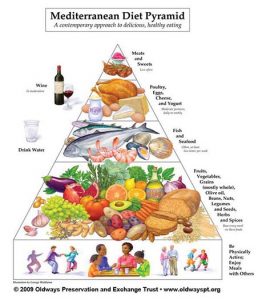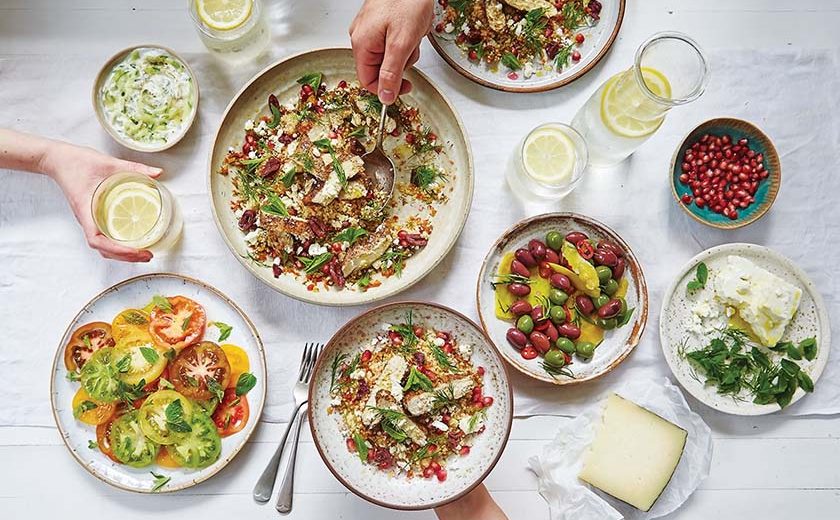When we speak of health and healthy diets, it’s hard to leave out the Mediterranean diet, which includes lots of greens, olive oils, nuts and seafood. It is said to be one of the healthiest ways of eating known to mankind. Let’s find out why.
The Mediterranean diet incorporates the traditional healthy living habits of people from countries bordering the Mediterranean Sea, including France, Greece, Italy and Spain. Funny enough though, when we think of a visit to these places, we tend to think of pastas, lamb chops, pastries, etc, which do not exactly fall into the category of healthy eating. This is why, it’s always been reminded that the Mediterranean diet is more of a way of eating, or a healthy eating habit, of the people, which may also vary according to country and region.
A true Mediterranean diet consists mainly of a whole lot of fruits and vegetables, (think dark green leafy vegetables, as well as colourful ones such capsicums and peppers); seafood (salmon, mackerel, shrimp, etc); superior quality olive oil as well as other healthy fats such as avocados; whole grain bread, vinegars, etc. It also contains a fair amount of poultry, eggs as well as probiotics in the form of yogurt. There is very little meat consumption in the true Mediterranean diet, and sweets are also eaten in very minimal amounts. While we may refer to our diets as the foods we eat, especially in regards to our health, the Mediterranean diet however is more akin to the way of life of the people in the aforementioned regions, which is said to be the secret to their longevity. The pyramid on this page will give you a clearer picture of what the Mediterranean diet, or rather, how the lifestyle looks like.

Why People There Live Longer, Happier Lives
Yes, thanks to movies mainly, it’s easy to picture a family gathering in Italy where everyone is seated at a ridiculously long tables lined with pastas, pizzas, lagsanas, loaf after loaf of white bread, racks of lamb and of course, free flow of wines. That doesn’t sound like the healthy diet we’re discussing here, and it’s not! It’s no doubt that those foods may be abundant and enjoyed lavishly at big family celebrations, gatherings, ect. There is also the fact that times have been changing and unfortunately for some of these countries, the younger generation, especially, seem to be bending toward the ever popular Western ways of eating which include fast foods, trans fats, lots of heavily modified and processed dairy products and sugars. The traditional, health-giving Mediterranean diet, to many youngsters over there, is getting to be as passes as ulam is to our younger generation here. Ulam, by the way, consists of fresh, raw vegetables eaten with a special home made sauce.
The more ethnic way of eating, however, shows no signs of dying off, what with experts and scientists the world over showing great interest on it. While the younger generation are getting to be a tad too vulnerable to the ill-effects of the Western diet, health enthusiasts from all over the world are going to great lengths to mimic the Mediterranean diet, which is based originally on the region’s traditional whole foods or produce which include fruits, vegetables, beans, nuts, seafood, olive oil, and full cream dairy, with perhaps a glass or two of red wine. After all, this is how the inhabitants of Crete, Greece, and Southern Italy ate circa 1960, and back then, their rates of chronic disease were among the lowest in the world and their life expectancy among the highest, despite having only limited medical services!
More Than A Diet (Or What To Eat)
The true Mediterranean diet, although called so, isn’t merely about what to eat to stay healthy. It’s an overall way of life which include daily physical activity and sharing meals with others – these are, altogether, the vital elements of the Mediterranean Diet Pyramid.

It may not be an easy concept to follow, especially if we’ve been living rather unhealthy lifestyles with free and easy eating habits which include fast foods and sodas, for example. However, chances are, this current lifestyle which you know and practice so well by now may already be reaping some negative results on your health and wellbeing. On the contrary, everything about the Mediterranean diet will produce just the opposite results in your life, should you choose to try it. It can have a profound effect on your mood and mental health and help you foster a deep appreciation for the pleasures of eating healthy and delicious foods.
Yes, we fully understand that making big changes to your diet is rarely easy, especially if you’re trying to move away from the convenience of preparing meals using canned or processed foods, eating on the go, ordering take outs from the hundreds of choices available today, etc, but take heart, for the Mediterranean diet can still be doable for you. In fact, if you really sit down and take charge, it’s not as hard as it seems. Here are some useful pointers:
- Your main meals should include good quality whole grains such as brown rice, pastas, and breads. Base your meals on starchy foods such as potatoes, bread, rice and pastas, as well as other starches such as potatoes and tubers.
- Include beans or pulses, oily fish, and eggs at least three times a week
- Ensure that you get at least five servings of various fruit and vegetables every day – think five different colours
- Drink 6 to 8 glasses of fluid a day
- Have some dairy or dairy alternatives (such as soya drinks) – choose lightly sweetened or unsweetened whenever possible
- When it comes to the consumption of fats (other than olive oils and avocados), as well as salt and sugar, remember to have them less often and in minimal amounts.
- Choose unsaturated oils and spreads, and eat them in small amounts
Note: If it’s too much of a challenge to make radical changes all at once, do it gradually. You can achieve this balance a day at a time or even throughout the course of the week.
How The Mediterranean Diet Can Help Turn Your Health Around
Judging from the large quantities of fresh produce, nuts, fish and olive oil, coupled up with an active lifestyle, it’s not that difficult to see why the Mediterranean diet can be of assistance in addressing a host of health issues plaguing many Malaysians today. By limiting one’s intake of refined breads, processed foods, and red meat, for instance, heart diseases and strokes can be kept at bay. The older you are, the higher you’ll probably benefit from the Mediterranean diet, for you’ll also be considerably reducing the risk of developing muscle weakness and other signs of frailty.

Researches have been proving now and then that the Mediterranean diet may improve cholesterol, blood sugar levels, and overall blood vessel health, which in turn may reduce the risk of Alzheimer’s disease or dementia. Also, the high levels of antioxidants in the Mediterranean diet can prevent cells from undergoing a damaging process called oxidative stress, thereby cutting the risk of Parkinson’s disease too.
Is it any wonder now that the longevity rate of people who consume the Mediterranean diet on a full scale is higher than the majority of the world?
Take Home Messages:
- Include plenty of fresh fruit and vegetables
- Include some fatty fish in your diet
- Eat some wholesome breads made from whole grains
- Be particular about the oil you use for your cooking – you’ll hardly go wrong with good quality olive oil
Sources:
www.nhs.uk
www.helpguide.org


